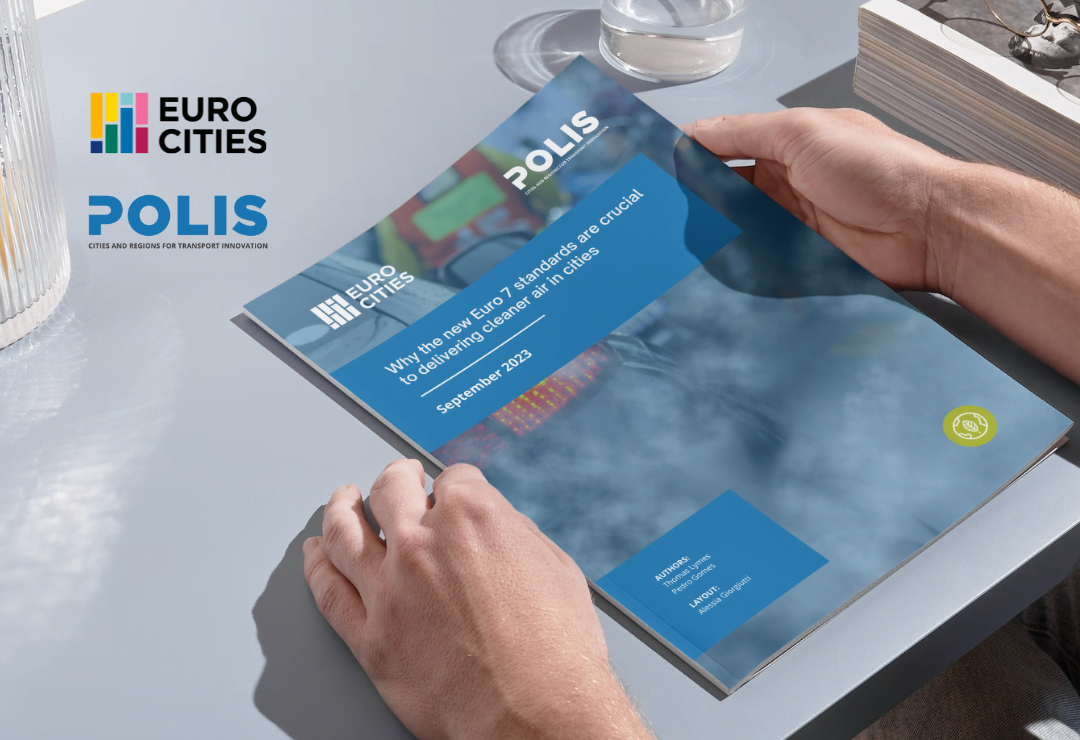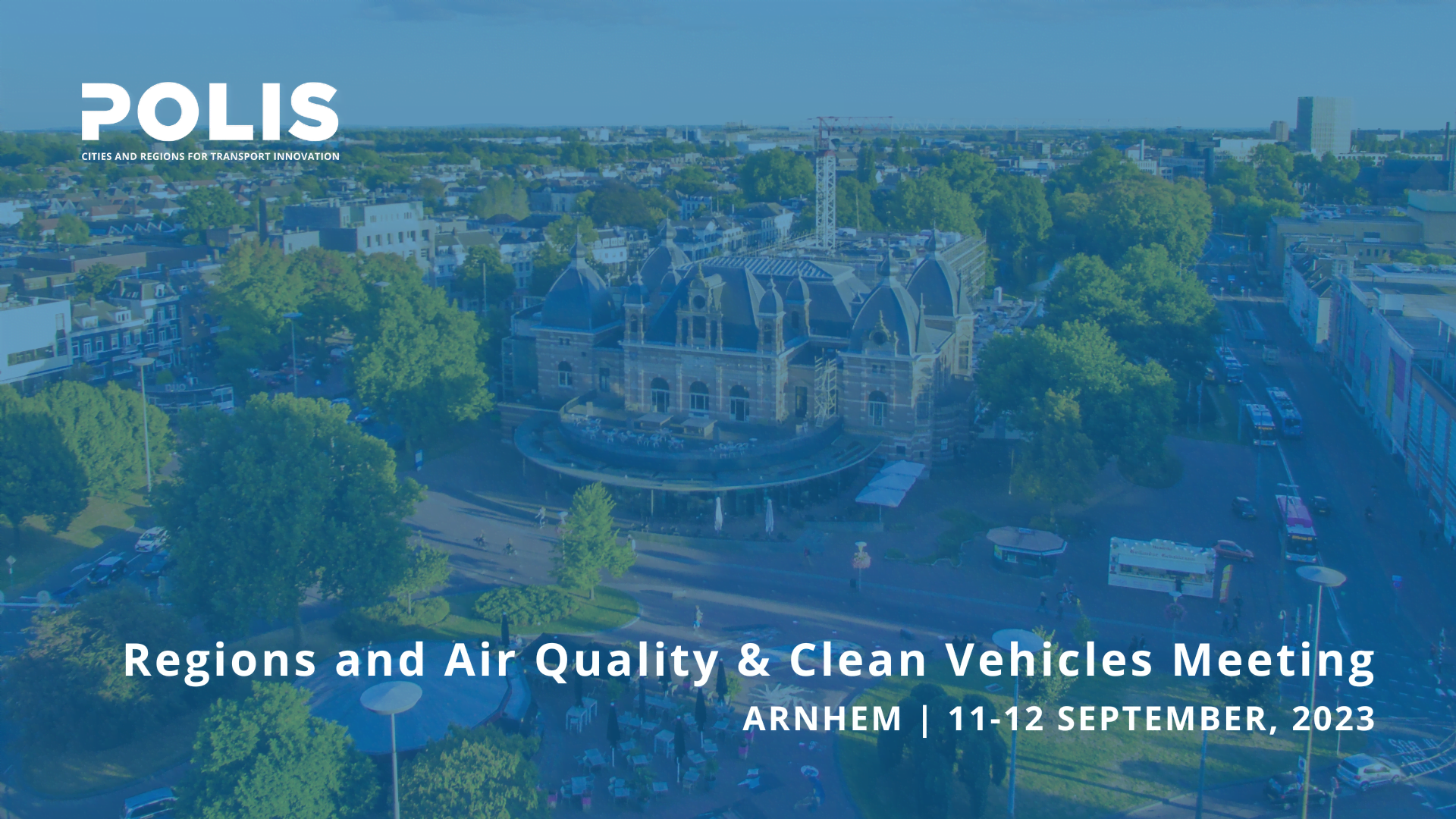POLIS and EUROCITIES call for strong Euro 7 standards to improve air quality
Ambitious Euro 7 standards are needed to limit road transport-related emissions, improve air quality, and safeguard citizens’ well-being. POLIS and EUROCITIES, two leading networks of cities and regions for sustainable mobility, explain why and highlight their key messages in a new brief for our Members and more.
On 25 September 2023, The Council reached a General Approach on the Euro 7 legislative proposal for light-duty and heavy-duty vehicles. Unfortunately, the Council’s agreement significantly weakens the European Commission proposal by keeping the current Euro 6 exhaust limits for light-duty vehicles and not being ambitious enough for heavy-duty, as well as proposing a delay in its implementation. POLIS and Eurocities, on behalf of our member cities and regions, urge the co-legislators to push for stronger Euro 7 standards and their swift adoption as part of the trialogue negotiations before the upcoming EU elections in June 2024.
Europe's number one environmental health risk
In 2020 alone, air pollution led to 311,000 premature deaths in the EU’s 27 Member States (EU-27), making air pollution the number one environmental health risk in Europe. In particular, road transport-related emissions have a detrimental impact on Europe’s urban air quality. Each year, they account for an estimated public healthcare cost of more than 1,200 € per inhabitant.
As a result, significant reductions in emissions from road vehicles are needed to achieve the European Green Deal’s zero pollution action plan. Moreover, they'll play a vital role in bringing the EU’s air quality standards more aligned with the 2021 recommendations of the World Health Organization (WHO), as proposed in the Revision of the Ambient Air Quality Directive (AAQD). Without a high level of ambition in emissions reduction, it will be impossible for many cities and regions to comply with more stringent AAQD levels.
Euro 7 standards for better air quality
Announced on 10 November 2022, the European Commission’s (EC) proposed Euro 7 standards offer an opportunity to curb emissions from road vehicles with internal combustion engines (ICE). While the proposed requirements are technically and economically feasible, POLIS Network and Eurocities warn that they may not be enough to keep pollutant vehicles off the road.
In the meantime, automotive industries will likely continue to shirk responsibility for air pollution reductions and public health, forcing regional and city governments take pick up the slack.
The message: Euro 7 will work, and it’s needed!
In a nutshell, the key points of the message from POLIS and Eurocities are the following:
1. Euro 7 is essential to allow public authorities to attain the future EU air quality standards. Without the correct policy tools in place, cities and regions will have to bear the burden of air quality compliance. This means that they will have no other choice than to implement even more stringent measures to keep pollutant cars away from their territory and protect public health, such as expanding Urban Vehicle Access Regulations (UVAR) schemes, implementing Low Emission Zones (LEZ) and Zero Emission Zones (ZEZ), or adopting brand-new congestion-charging schemes. These are unpopular measures that come at a high political cost.
2. There is an erroneous dichotomy between Euro 7 and electromobility. Although the future of road transport is electric, with the ban on ICE vehicle sales from 2035 onwards, there will still be gasoline and diesel cars circulating on Europe's roads well beyond that date, given the average lifespan of today's vehicles. Moreover, electrification in Europe is not happening at the same speed in all Member-States. Therefore, it is imperative that these vehicles are as clean as possible.
3. Finally, Euro 7 is a matter of public health! Cities and regions must be provided with the tools to adequately protect vulnerable populations, such as older people, children, pregnant women, and those living with medical conditions, all of whom are particularly vulnerable to the harmful effects of air pollution.
Pushing for greater ambition
To ensure that the Euro 7 standards are a boon for cities and their residents, they must also support the growing ambition of public authorities and work on the scientific evidence that informed the WHO Guidelines and the revision of the AAQD.
In cooperation with Eurocities, the Clean Vehicles and Air Quality Working Group at POLIS has delivered a brief to our Members and external stakeholders, calling for key improvements to the EC’s proposal. Among others, the document highlights the following changes to the Euro 7 standards:
- Adoption of limit values for key air sufficient to meet the air quality standards of the revised AAQD
- Requirement for emissions testing conditions to match actual car usage in European cities
- Extending the period of validity for emissions restrictions to reflect the real lifespans of pollutant (ICE) vehicles, including on the second-hand market
- Limit the complexity of new categories of vehicles to be type-approved (Euro 7+ and Euro 7g) to facilitate their re-use in the context of low-emission zone enforcement
“Our cities need fewer, but also cleaner cars. While electromobility is quickly becoming a reality in Europe, it is not a silver bullet, and we will still see millions of internal combustion engine vehicles circulating on our roads in the next decades. Without proper policy tools like an ambitious Euro 7 in place, cities and regions will not be able to properly safeguard the health of their citizens and their right to clean air – this remains a major health challenge.”
Karen Vanclusen, Secretary General of POLIS
“The Council's decision on Euro 7 will hamper cities' efforts to reduce air pollution. This is not the time to adopt a lenient position on vehicle emission limits; rather, it is time to deliver on the EU’s ambition to provide a zero pollution environment for all urban inhabitants and set more stringent rules on air quality. We urge the European Parliament to side with cities and regions on this important piece of legislation, lest we miss this critical opportunity to clean the air.”
André Sobzak, Secretary General of Eurocities
The bottom line
European cities and regions need (and must demand) a strong Euro 7 emission standard. Stringent emissions standards present a key opportunity – perhaps the last – to lessen the detrimental consequences of road transport-related air pollution from internal combustion engines. Without strong standards, the health and social and economic well-being of citizens is at risk.
You can read the full report by POLIS and EUROCITIES here.

